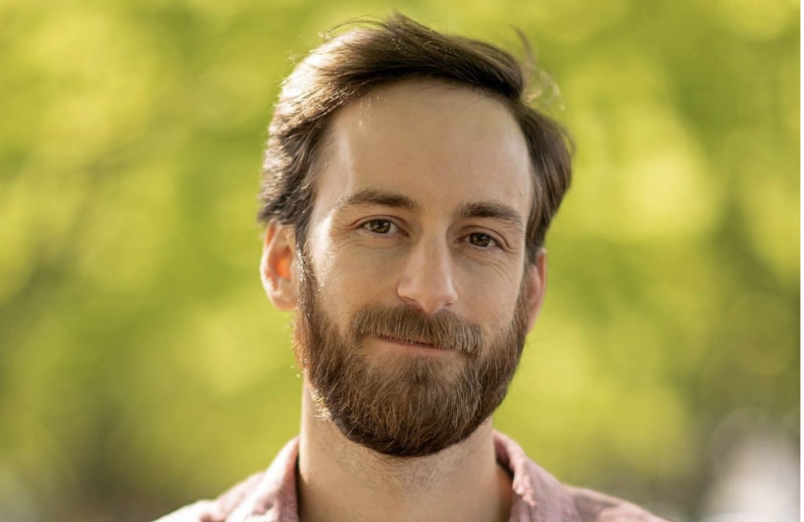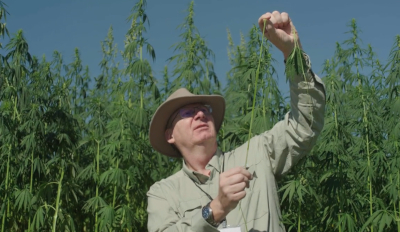INTERVIEW: A writer, director, and director of photography, Jordan Berger is the founder of Sunflower Films, a production company in Chattanooga, Tennessee, USA. He is currently completing production on ONE PLANT, a documentary about hemp’s potential to address a wide range of pressing global challenges. He also heads up Head River Farms, an organic hemp and veggie farm in Apison, Tennessee.
HempToday: What is the inspiration for the film?
Jordan Berger: After seeing my mother suffer a lifetime of alcoholism and opioid addiction, I grew a passion for the power of plant-based medicines – specifically cannabis as a natural solution that could help. In 2019 I started a hemp farm to make my own CBD products for my mom. Unfortunately, before I was able to harvest my first crop, my mom passed away in 2019. Having started this journey with cannabis, I had grown to believe in the plant and how it could help people.
When I learned more about the plant, I realized medicine was only part of the story. This plant has been a key ally to humans throughout recorded history, used for medicine, food, textiles, shelter, energy, and more. Now for the first time in nearly a century, the plant stands to make a comeback. When we think hemp or cannabis we think drugs. I want to change that. I want to make a film that helps to normalize cannabis and opens eyes to the great benefit the plant can bring to all of us.
HT: What was the most surprising thing you learned throughout the research and making of the film?
JB: Probably just the sheer amount of things the plant can do. I knew it could do a lot, but this plant will continue to surprise you. Whether you’re looking at fiber, grain or flower, there are incredible advancements going on across all cannabis-based industries.
HT: The film is coming out at something of a low-water mark for hemp, after the CBD craze and crash, and a lot of contraction in the sector. What kind of marker will the film be? What can it say about the future of hemp as a business?
JB: I think we’re in a weird place where the public still doesn’t understand what this plant can do for humanity. The lack of regulation on cannabinoid hemp on the FDA’s part has created a confusing marketplace supporting the outdated views that cannabis and hemp are just for getting high. You see every gas station and strip mall selling a whole host of “legal cannabis” products aimed at giving people a buzz. Many aren’t natural at all and can be quite dangerous. It’s a shame because it’s giving the whole plant a bad look.
However, I believe once people start learning what the plant can do for climate change, healthy food systems, and how powerful of a medicine it can be when used properly, they will open their minds. I believe the future of industrial hemp and medical cannabis is bright. Our film showcases the seemingly endless possibilities of the plant from building your house and the car you drive, to treating a host of ailments and diseases through interaction with our own body’s endocannabinoid system. This plant has historically been a great ally to our species and it’s here to do it again. People simply have to learn more about the plant’s benefits and the good it can bring to each of our lives.
HT: What audience were you thinking of when you conceived the film, and throughout its production?
JB: From the beginning, I’ve sought to make a film for the everyday person. I never wanted to make a film catered to marijuana people or stoner culture. Instead, I imagine a film for folks who care about their health or the environment, or people just trying to do better in this world. This plant has a wide range of uses and applications and I hope, therefore, the audience can reflect that range.
HT: Describe the response so far to the trailer, and the Kickstarter campaign.
JB: We’ve had a tremendous amount of support following the release of our new trailer and Kickstarter campaign. It’s been awesome feeling the love from people you’ve never met. It’s a confidence boost for sure.
HT: Aside from financing, what are the other challenges that face independent filmmakers these days?
JB: Making a film is hard, there’s no way around it. We’ve been at it for 2+ years as a “side job” as we continue to run our production company in Tennessee. Today I’d say one of the biggest challenges with a documentary like this is keeping up the momentum. It has taken more time than expected and we’ve had to pause production at several points. It’s all about remaining creatively excited about the project and sometimes that’s hard when you have to pause for a month or two at a time.
HT: You’ve described your crew as “lean and agile.” What kind of people do you look for in putting a team together to tackle a project?
JB: A project with limited funding like this requires everyone involved to wear several hats. You want people you can count on who don’t get too flustered when something new is thrown their way. Everyone on the ONE PLANT team embraces this agile approach needed when making a film involving real life. A project like this requires many hours with the same people so you better enjoy hanging around them. Luckily the guys that have helped me on this are also some of my best friends.
HT: What remains to be done to finish the film? When is it scheduled for release?
JB: At this point, 90% of the footage has been shot and we’re close to having a full rough cut of the film. We will begin getting outside feedback and make any necessary changes before finishing with sound, color, and score/music. We expect to be editing the film through February 2025 and then immediately begin submitting it to film festivals. We expect a full release in the second half of 2025.


